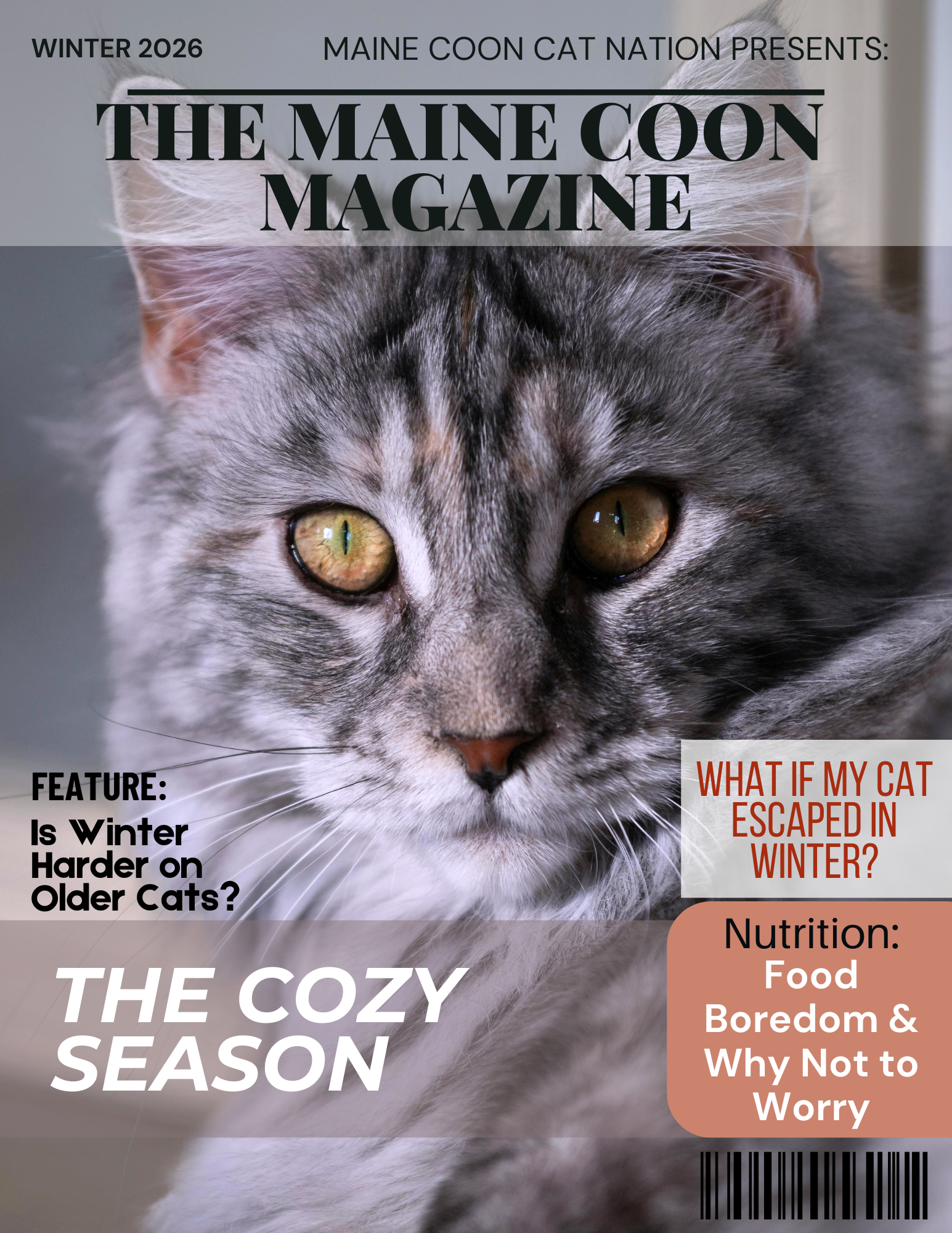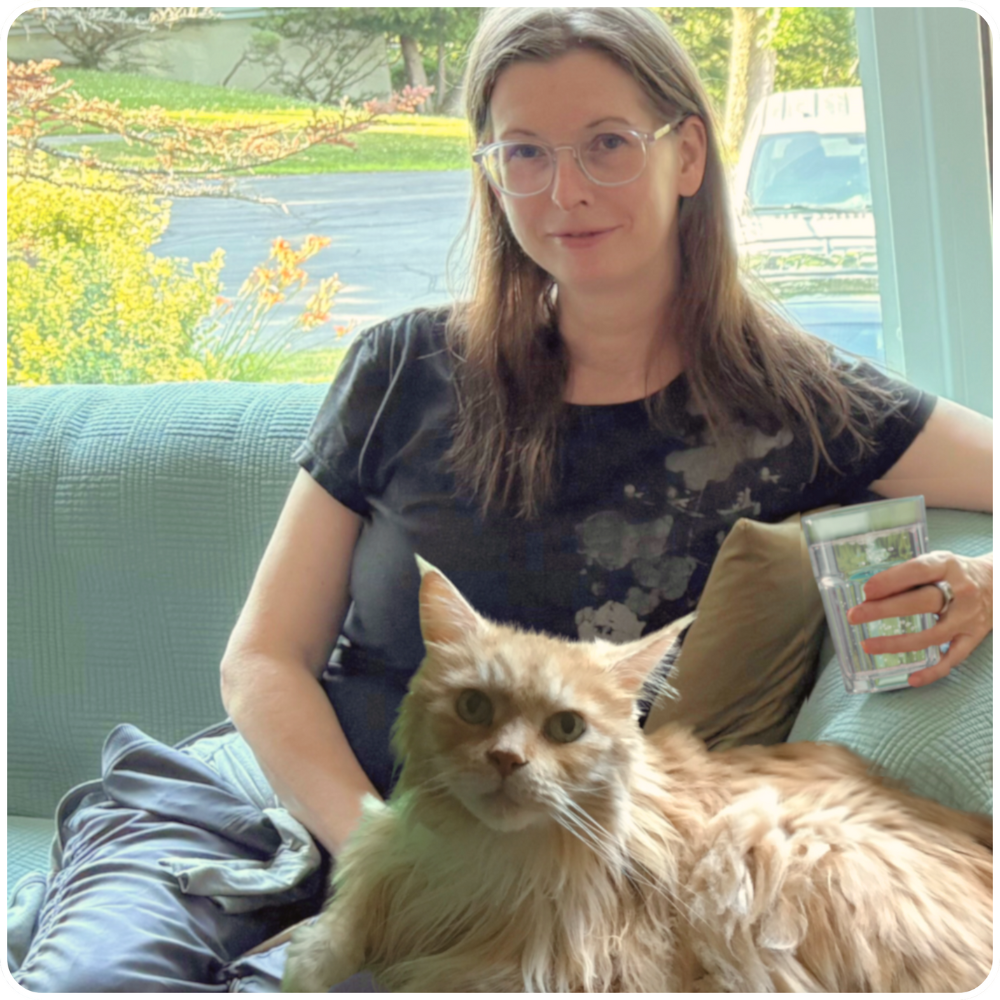- Home
- Maine Coon Cat Breed
- Maine Coon Barn Cat
A Maine Coon Barn Cat?
Growing up in Maine, I always heard Maine Coons described as barn cats - not in the pedigreed, prize-winning sense, but as the sturdy mousers who earned their keep on the farm.
When you live in a place where it feels like winter half of the year, with snow measured in feet, any cat that could thrive outdoors had to be something special. And this breed fit that bill.
If you like this, you'll love our fun, free Daily Digest!

Imagine the 1800s Farmstead
Picture a Maine farm in the mid-1800s. A wood-heated house, acres of crops, horses and cows in the barn, and mice everywhere. A good barn cat wasn't optional - it was a necessity.
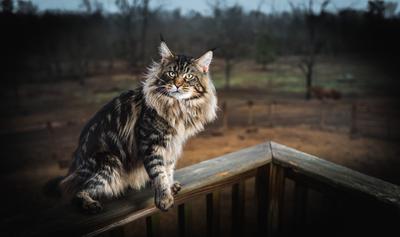 Metatroneyes Lee Browning, from our '17 Albums
Metatroneyes Lee Browning, from our '17 AlbumsThis was the world that shaped the breed. Hardy and resourceful, they kept barns and granaries free of rodents while bonding with the families who relied on them.
Over time, those working cats made the leap from barn to show hall, and it’s no wonder that by 1895, when the very first cat show was held at Madison Square Garden, a cat named Cosey proudly won Best Cat.
Before the bright lights and ribbons, though, these longhaired farm cats were simply everyday companions in New England.
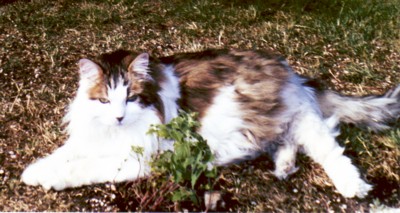 Regis, from our Rainbow Bridge Album
Regis, from our Rainbow Bridge AlbumDo Maine Coons Make Good Barn Cats?
The answer is both yes and no.
Yes, in the homesteading sense.
Many families today are embracing small-scale farming and homesteading, and in that environment, a Coonie can shine.
They're often natural hunters, excellent mousers, and big enough to hold their own.
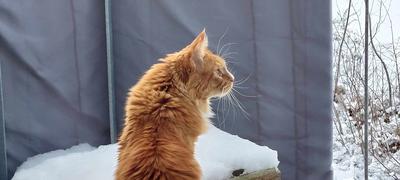 Ginny, from our Breeder Testimonials Collection
Ginny, from our Breeder Testimonials CollectionA cat of this breed that lives as part of a family - sleeping inside at night and roaming barns or gardens by day - is a nod to their roots as working cats.
No, if "barn cat" means left to fend for itself.
There's another meaning of "barn cat" that still floats around: a cat you simply put on your property, leave in the outbuildings, and hope will handle the rodent problem with a little kibble thrown its way.
That's not a life suited for a Maine Coon - or any pet cat.
With predators, cars, and disease, it's just not safe. This breed deserves the warmth of home and the bond of family, not a solitary life in a drafty barn.
The Two Sides of the Coin
The Homesteader's Cat:
Families who love their cats as companions first and rodent control second.
These cats chase mice in the tack room, follow their people out to the barn, trot alongside during chores, and investigate every corner of the outbuildings.
After a busy day of companionship and exploring, likely to curl up by the woodstove or on a lap. They will sleep with their family.
It's the modern version of their heritage - part working mouser, part shadow, and always a family member.
But What About Safety?
Some readers might be thinking, "All Maine Coons should be indoor cats!" And that’s a fair point. Safety is a huge concern, and Coonies should be kept indoors in most households.
In a homesteading family, though, the choice to let a Coonie enjoy barn life is made carefully.
These families usually take every step possible to protect their beloved pets: secure outbuildings, supervised outdoor time, and a lifestyle where the cat is rarely far from its people.
It's less about "letting the cat out" to fend for itself, and more about blending the old barn-cat heritage with the attention and care of a modern family companion.
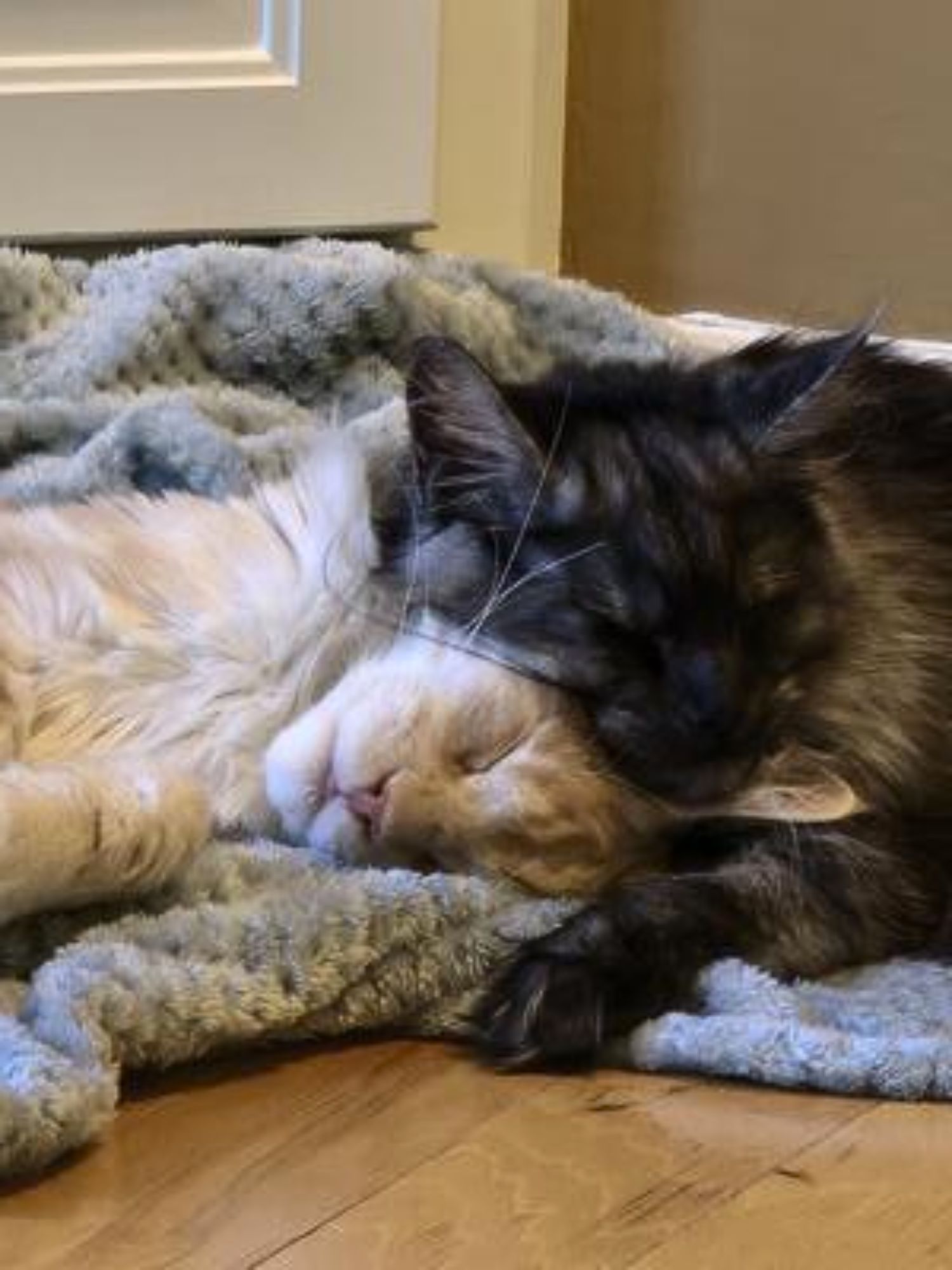 Sweet Siblings Finn and Pippi
Sweet Siblings Finn and PippiThe "Set-and-Forget" Barn Cat:
Others use the phrase to mean a cat left on the property with little more than a food dish and a hope it will keep rodents in check.
These cats might spend their lives in drafty barns or roaming acres with no real safety from cars, predators, or disease.
It's a hands-off approach that treats a cat as a means to an end, instead of a companion.
Ferals or working-cat adoption programs might suit that role better, but not a family-oriented breed like this one.
Feral and Working Cat Programs
When people hear "barn cat," they sometimes mean a feral or semi-feral cat placed through a working cat program.
Many shelters and rescues run these programs for cats that aren’t suited to indoor life but still deserve a safe, supported home.
Instead of being adopted into a living room, these cats are placed on farms, warehouses, or stables where they provide rodent control.
That usually means a few weeks of acclimation in a secure space, regular food and water, shelter from weather, and basic vet care.
These cats aren’t expected to be lap cats - they "work" while still having their needs met. It's a good solution for ferals, but it’s very different from bringing home a purebred kitten and calling it a barn cat.
"The Fluffy Ones" in the Barn
Another idea that floats around is that when a litter of kittens is born in a barn, the long-haired or fluffy ones must be Maine Coons.
It's an easy assumption to make, especially here in Maine where the breed has such a strong cultural presence.
The truth is, this is a specific, recognized breed. Just because a kitten is fluffy doesn't mean it's a Maine Coon.
More often than not, those kittens are domestic medium hairs or longhairs - regular cats with mixed ancestry. That doesn’t make them any less wonderful, but it does mean they aren't the same thing as a registered purebred.
That said, could there be a Maine Coon mix in a barn litter? Absolutely. Over the generations, purebreds and mixes have mingled with local cat populations, especially in rural areas.
So while a fluffy kitten in a barn might have some heritage from this breed, calling every long-haired barn kitten a Maine Coon is stretching it.
Are Maine Coons Really Good Mousers?
One of the classic images of a Maine Coon barn cat is a fierce mouser, patrolling the feed bins and never letting a rodent get by.
And yes, they can be excellent hunters. Their size, agility, and natural instincts give them all the tools they need.
But here’s the thing: not every Coonie has the same style of "mousing."
My Alice, for example, caught quite a few mice. She also cornered, played with, and released just as many!
To her, the chase was the fun part, not the clean finish. And then there's Leo, who gave us a family story we'll never forget: one day he gently caught a mouse, carried it to his food dish, and delicately set it on top of the food in his dish - just like he did with his toys.
He sat back looking pleased, as if he’d saved it for later. The mouse looked up at him, clearly surprised at its good fortune, and ran off. Leo's face was pure confusion! It was hilarious.
The truth is, these big cats can be capable mousers, but not every one of them is a stone-cold hunter.
Some will do the job, some will play, and some will "save" their catch for later. If you're thinking of a Maine Coon as a barn cat, keep in mind that you're getting a personality (and a family member) as much as a skill set.
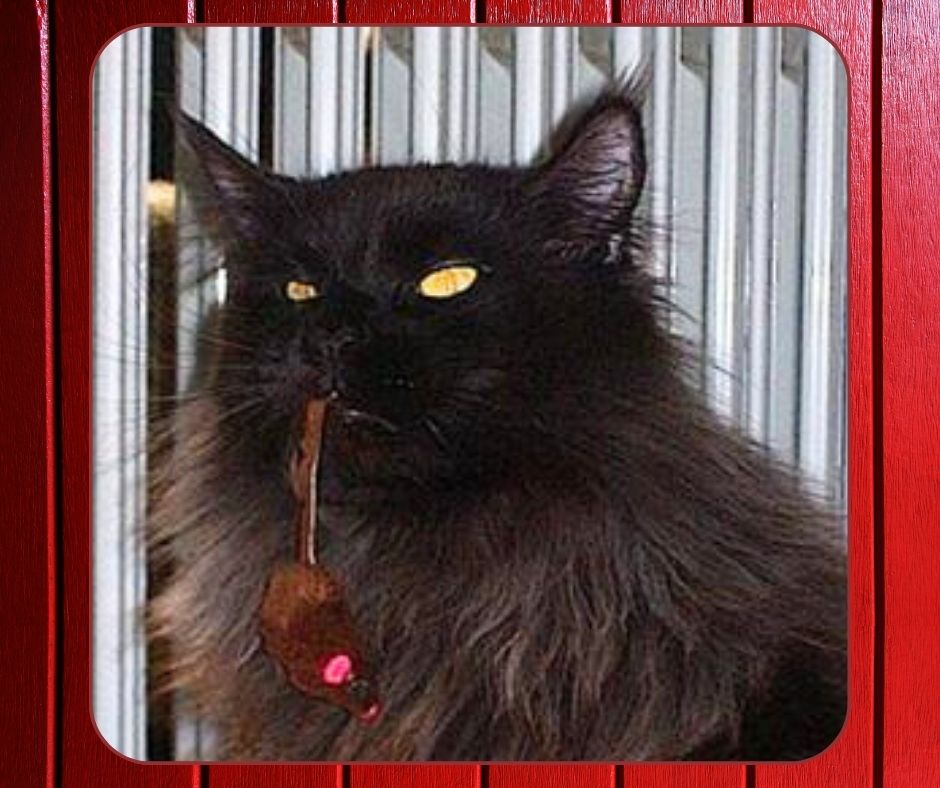 Sven and his mouse
Sven and his mouseAmerica's Native Breed
The Maine Coon barn cat is more than just a romantic notion - it's a real part of the breed's history.
This breed earned its place in Maine folklore by being strong enough to survive winters, clever enough to hunt, and friendly enough to win hearts.
Today, the best way to honor their legacy today is by giving them the life they truly deserve. For some families, that includes safe opportunities to roam and explore; for all, it means the comfort and security of a home indoors.
Or, head back to our Maine Coon Breed Info section for more on their history, myths, and all the stories that surround this unique breed.
